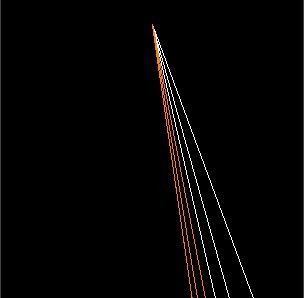Processing初接触笔记(1)
昨晚上在豆瓣浏览关于arduino的内容时注意到了Processing. 很高兴它是一个开源的框架,并且其语法是JAVA语言并且简化了很多。并且支持现在所有主流的操作系统。对了,早前jquery的作者也把一大部分的功能移植到了WEB上面。对于前端开发者去学习是个好消息。
http://processing.org/learning/ 在官网看到了些教程,写的非常不错。
他主要程序运行的结构是
void setup(){}
void draw(){}
这个结构是比较固定的
其他自定义的方法还是比较随意。
系统封装监听事件 还有
void keyPressed(){
}
void mousePressed(){}
分别是 监听键盘和鼠标按下事件,还有好多简化方法不再一一赘述以后的学习笔记再说明。
今天主题是对程序的hello world
/** * * Sketching with Processing. * KnowledgePoint :stroke(255) * Author: TingChao.Guo **/
void setup(){
size(300,300);
background(0,0,0);
stroke(255);
line(150,25,270,350);
}
void draw(){
stroke(255); // sets the stroke color to white
line(150,25,270,450);
stroke(255, 255, 255); // identical to the line above
line(150,25,270,550);
stroke(255, 128, 0); // bright orange (red 255, green 128, blue 0)
line(150,25,270,650);
stroke(#FF8000); // bright orange as a web color
line(150,25,270,750);
stroke(255, 128, 0, 128); // bright orange with 50% transparency
line(150,25,270,850);
}
结果图:
写一个完整点的:
/**
*
* Sketching with Processing.
* KnowledgePoint :stroke(255)
* Author: TingChao.Guo
*
* */
int radius=180;
int degree=0;
void setup() {
size(500, 500);
background(0, 0, 0);
strokeWeight(3);
smooth();
}
void draw() {
float angle = radians(degree);
float x =250 + (cos(angle) * radius);
float y =250 + (sin(angle) * radius);
stroke(random(256), random(256), random(256), random(256));
line(x,y,250,250);
print("x :"+x+'\t');
print("angle :"+x+'\t');
print("y :"+y+'\t'+'\n');
degree++;
delay(300);
}

